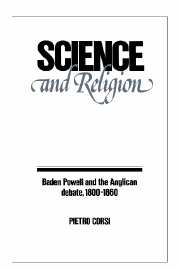Book contents
- Frontmatter
- Contents
- Preface
- List of abbreviations
- PART I
- Biographical introduction
- 1 The Hackney Phalanx: a family network
- 2 Baden Powell's early theological papers
- 3 Baden Powell's reflections on science in the early 1820s
- 4 Science and religion in the 1820s
- 5 Rational Religion Examined
- 6 Baden Powell between Oriel and Hackney
- PART II
- PART III
- PART IV
- Bibliography
- Index
6 - Baden Powell between Oriel and Hackney
Published online by Cambridge University Press: 15 December 2009
- Frontmatter
- Contents
- Preface
- List of abbreviations
- PART I
- Biographical introduction
- 1 The Hackney Phalanx: a family network
- 2 Baden Powell's early theological papers
- 3 Baden Powell's reflections on science in the early 1820s
- 4 Science and religion in the 1820s
- 5 Rational Religion Examined
- 6 Baden Powell between Oriel and Hackney
- PART II
- PART III
- PART IV
- Bibliography
- Index
Summary
The preceding chapters have drawn attention to the relevance of Baden Powell's early literary output to the understanding of Oxford and English intellectual life in the 1820s. Historians have customarily opposed traditional High Church theology and the Oxford Movement to the daring ‘liberalism’ of the Noetics. The term ‘liberal’ in this context has been grossly misused. A mistaken analogy with the meaning of the term in the later decades of the nineteenth century has biased the assessment of intellectual and religious movements in the early decades of the century. Thus Edward Sillem, the learned editor of Newman's philosophical notebooks, described Hume, Bentham and Locke as the prophets of the ‘liberal world’ in the eyes of British intellectuals active in the first quarter of the nineteenth century.
The analysis of Baden Powell's early works demonstrates that the philosophy of John Locke admitted of more traditional and conservative uses in High Church circles. Many clergymen viewed the revival of the Lockean theme of the reasonableness of Christianity as a major success in the fight against Unitarianism and ‘liberalism’. Sillem also described the ‘Liberal Enlightenment’ as a movement which ‘would lead Anglicans like Whately towards… enforcing the principle that articles of faith can be passed as credible on the sole condition that they can survive the severest logical test as satisfactorily as any purely mathematical theorem’. W. R. Fey has recently argued that the ‘Noetics… concluded that the truths of faith like those of mathematics should be immediately compelling to an honest mind’.
The early works by Copleston and Whately show that the Noetics made considerable efforts to prove that the reverse was true.
- Type
- Chapter
- Information
- Science and ReligionBaden Powell and the Anglican Debate, 1800–1860, pp. 73 - 80Publisher: Cambridge University PressPrint publication year: 1988

